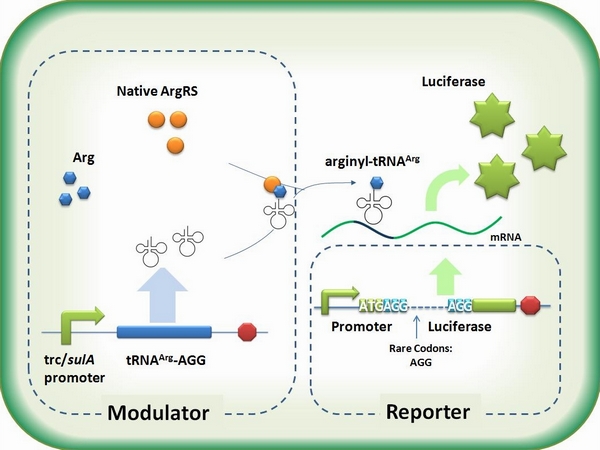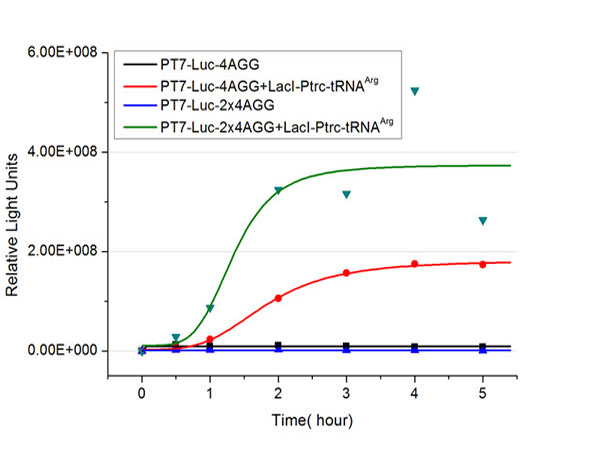Team:SJTU-BioX-Shanghai/Project/Subproject1/Results 2
From 2011.igem.org
(→tRNA Modulator + Reporter for Quantitative Analysis) |
(→tRNA Modulator + Reporter for Quantitative Analysis) |
||
| Line 76: | Line 76: | ||
Moreover, strong promoter (T7) of target gene can improve the titration curve of tRNA Modulator, indicating that tRNA Modulator works better under strong target protein promoters. | Moreover, strong promoter (T7) of target gene can improve the titration curve of tRNA Modulator, indicating that tRNA Modulator works better under strong target protein promoters. | ||
| + | |||
'''3.Influence of different numbers of AGG codons put after start codon ATG in tRNA Modulator Working Curve.''' | '''3.Influence of different numbers of AGG codons put after start codon ATG in tRNA Modulator Working Curve.''' | ||
Revision as of 01:28, 6 October 2011
|
|
tRNA Modulator + Reporter for Quantitative Analysis
tRNA Modulator and Reporter for Quantitative Analysis work together to regulate protein biosynthesis. tRNA Modulator controls rare tRNA amount. In our project, we use sulA promoter (BBa_K567002 sulA promoter-tRNAAsp-AGG) or trc promoter(BBa_K567001 lacI-Ptrc-tRNAArg) to control rare tRNA amount. tRNA Modulator: BBa_K567002 sulA promoter-tRNAAsp-AGG BBa_K567001 lacI-Ptrc-tRNAAsp-AGG Reporter can control two elements: the number of rare codons inserted into luciferase after start codon ATG and the strength of target protein promoter. In our project, 2, 4, 6, 8 rare codon AGGs are inserted into the Reporter gene. T7 promoter or bla promoter are used to control target protein mRNA amount. Reporter: BBa_K567004 Pbla-Luc-2AGG BBa_K567005 Pbla-Luc-4AGG BBa_K567006 Pbla-Luc-6AGG BBa_K567007 Pbla-Luc-8AGG BBa_K567008 PT7-Luc-2AGG BBa_K567009 PT7-Luc-4AGG BBa_K567019 PT7-Luc-6AGG BBa_K567010 PT7-Luc-8AGG Luc for luciferase We have tested different combination of tRNA Modulators and Reporters and analyzed the influence of promoter strength for rare tRNA, number of rare codons in target protein mRNA and promoter strength for target protein gene respectively. 1.The Working Curve of tRNA Modulator We have tested luciferin reaction in cells with different combinations of tRNA Modulators and Reporters. We examined the changes in luciferase enzyme activity over time after rare tRNA expression is induced. The amount of luciferase is reflected indirectly by the bioluminescence emitted from the luciferin reaction. Results are shown below:
From this experiment, we noticed that the typical working curve of tRNA Modulator can be better observed with IPTG induced tRNA Modulator (lacI-Ptrc-tRNAAsp) compared with UV excitation induced tRNA Modulator (BBa_K567002 sulA promoter-RNAAsp), though sulA promoter-tRNAAsp responded quicker to signals. We step further to test the influence of different Reporters with tRNA Modulator lacI-Ptrc-tRNAAsp.
We examined the influence of different Reporter promoters on the working curve of tRNA Modulator, which is reflected by luciferase activity. Results showed that all the tRNA Modulator working curves fit titration curve, indicating that tRNA Modulator can act as a satisfying regulating tool.
However, the working range of tRNA Modulator is pre-defined by the strength of target protein promoter, T7 promoter and bla promoter in our project. Moreover, strong promoter (T7) of target gene can improve the titration curve of tRNA Modulator, indicating that tRNA Modulator works better under strong target protein promoters.
The working curve of tRNA Modulator still fit titration curve under Reporters with different number of AGG insertions, indicating that the number of rare codons in the Reporter will not affect the stability and function of the Modulator. The influence of different number of rare codons in regulating protein biosynthesis is shown below:
We have obtained PT7-Luc-2x4AGG (BBa_K567021) unexpectedly during our experiment. We have tested the enzyme activity of this part under tRNA Modulator control and have compared the curve with PT7-Luc-4AGG (BBa_K567009) with the same tRNA Modulator. The result is shown below:
Though we may not able to explain this phenomenon now, we have realized that exploring the potential regulating modes in our system is promising and significant. We will spare no effort in exploring and perfecting our system in our future work. |
 "
"

